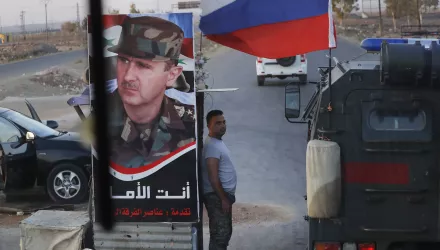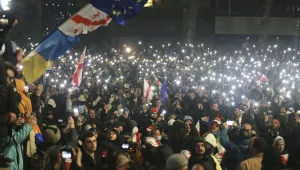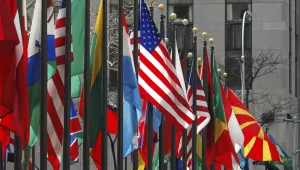One of the major ongoing debates these days is about the real meaning and consequences of the armed forces’ ousting of the elected government of President Mohammad Morsi in Egypt some three months ago, and the subsequent banning and arrests of the Muslim Brotherhood organization. This is an important debate that touches on the heart of the political realities that millions of Arabs have been struggling, sometimes dying, to define in the past nearly three years of uprisings—namely, whether public power and state authority will reflect the will of the majority and the consent of the governed, or instead will continue to be shaped and wielded by small handfuls of men with guns.
The school of thought that I subscribe to holds that the army’s populist coup marks a severe but temporary setback to the democratic transition that has been moving erratically since January 2011. Egypt and its democratic aspirations have been grievously wounded by the swift and severe manner in which the armed forces evicted and jailed Morsi, arrested most of the leaders of the Muslim Brotherhood, killed hundreds of pro-Morsi demonstrators, and then started exerting pressure on the mass media to conform to the generals’ policies. Not only was this bad enough, but many Egyptians also supported the elimination of the Muslim Brotherhood, including many whom we referred to as liberals in recent years.
I say this is a temporary setback mainly because of how Egyptians behaved several times since January 2011—first evicting Mubarak and his armed forces and crony capitalist regime, and then again insisting in the year to June 2012 that the armed forces turn over power to a legitimately elected civilian government. Those mass and repeated expressions of rejection of military rule were deeply felt political realities that did not reflect momentary whims—they were the result of six decades of military rule that transformed Egypt from a leader of the Arab world and the developing world into a backwater of mediocrity and mass citizen humiliation.
I suspect that in due course we will see the critical reactions of many Egyptians who are now silent or support the armed forces, but who will probably discover that rule by generals was the core of the problems that led so many Egyptians to oust the Mubarak government and start on the path towards democratic and constitutional pluralism. What actually happens in Egypt remains to be seen. It is possible that I am dreaming, and that Egypt’s democratic moment is over.
That, indeed, is the view held by those who feel that the last three months mark the definitive end of the democratic transition in Egypt, and the return of rule by the generals, with only cosmetic gestures to civilian rule. They see the severe crushing of the Muslim Brotherhood as a sign of a fascistic moment that also includes some nationalistic hysteria. This line of thinking despairs of a successful democratic transformation in Egypt, given the ferocity of the armed forces’ treatment of the Muslim Brotherhood and the apparent widespread support for this move among the Egyptian public.
We do not yet have sufficient evidence to know which of these two views of Egypt’s direction is more accurate. It is possible that we may see something in between, akin to the liberalizations that the Arab world experienced in the late 1980s and early 1990s, including parliamentary elections, new space for political parties and civil society organizations, and other signs of a peculiar Arab brand of liberalization without democratization. A dashing general may well run for the presidency and win on the strength of having restored order to a land that the Muslim Brothers had driven into disorder and fear.
Millions of Egyptians clearly were humiliated to such a great extent that they rose up in revolt against the Mubarak regime in January 2011. Was the fear of the incompetence and power-grab of the Muslim Brotherhood so great that these same Egyptians would welcome back the rule of the generals, simply to get rid of the Muslim Brothers?
It is very possible that we are seeing how the human need for basic security, jobs, food, gasoline and health and education services is so overwhelming that it takes priority over any issues of rights, freedoms and dignity in the political realm. It is also possible that Egyptians merely want a pause from the chaos of their political transition that the Muslim Brothers mishandled, and they trust the generals to provide that pause, ideally to be followed by a return to the path of forging a real democracy.
Egyptians do not have any other alternative right now. The Muslim Brothers are down for the moment, but they will return in another form. The non-Islamist political forces proved to be as incompetent as the Islamists. The armed forces are the only institution Egyptians trust for basic security. They rule again today, but for how long?
Rami G. Khouri is Editor-at-large of The Daily Star, and Director of the Issam Fares Institute for Public Policy and International Affairs at the American University of Beirut, in Beirut, Lebanon. You can follow him @ramikhouri.
Khouri, Rami. “The Generals Rule Egypt Again.” Agence Global, October 21, 2013





